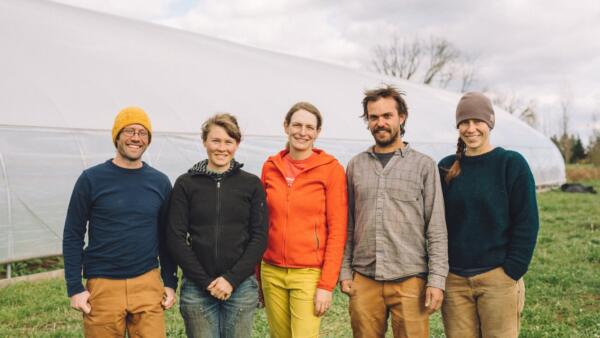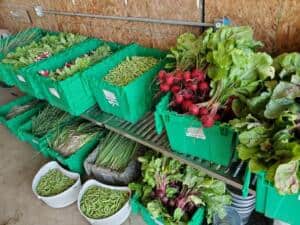Written by Jose Perez, OFRF’s Research & Education Engagement Coordinator

Nathan Lada is one of the four co-owners of Green Things Farm Collective, a diversified vegetable farm located in Ann Arbor, Michigan. The farmers produce an array of fresh market vegetables and cut flowers for CSA memberships, farmers’ markets, small grocery and small wholesale markets. The bulk of the production takes place in five acres of permanent no till/low till, deep mulch bed system from early April to October. The farmers also raise beef cattle and manage 40 acres of woods.
Nathan and his wife Jill started farming in this farm location in 2011, but the farm became what it is now when a longtime employee and two other independent farmers joined them in 2020. Since then, they have managed the farm as a single-unit LLC. The farm has been certified organic under the USDA since 2015, and has been Real Organic Project certified since 2020.
At right: Collective Farmers in 2020: Eric Kampe (left the farm in 2022), Hannah Weber, Jill Lada, Nate Lada, Michelle Brosius.
Figuring out plant spacing and densities
“Our primary focus is producing high-yielding species and varieties with lots of hand labor,” said Nathan. The farm operation employs between 15 to 20 people in the main season with the goal of maximizing production. “It’s hard to find information from other growers about their trials on spacing and plant densities, especially for high organic matter, high fertility, and fast turnover bed systems,” continued Nathan. When he heard about OFRF’s Farmer-Led Trial program from one of his employees, it immediately piqued his interest.
While the farm has done some limited experiments, they do not have comprehensive data to help them determine which row spacings are best for their production practices. Nathan and his colleagues hope that maximizing yield per bed will help the farm increase production without needing to develop new growing spaces. Nathan is excited to see the results and share the outcome of this trial with other growers looking for similar information.

“I think it is important that farms can conduct their own trials and research in a practical way to figure out what will work best under their cultivation systems. Our opportunity to work with OFRF will not only inform us about specific densities to improve production on our farm, but will also hopefully inform a repeatable pathway for us and others to make small improvements to our production based on practical farm-based trials that are simple and bring value to the farm.” – Nathan Lada

Farm trial plan
Beets and radishes are the focus of the farm trial because they are among the most produced crops at the farm, being planted in succession every week or every other week during the season. Although the farm already collects yield and some crop quality data per bed, conducting the on-farm trial with OFRF will provide the direct technical support to be more methodical and comprehensive in designing the farm trial, conducting data collection, and drawing trustworthy results.
Preliminary farm trial plans include comparing two crop configurations for one beet variety and two crop configurations for two varieties of radishes for yield and crop marketability. Potential measurements identified include overall yield (bunches per bed, pounds per bed), losses due to undersized or oversized crops, losses to disease, days to maturity, and crop quality.
The farmers have participated in on-farm research in the past, but felt that those trials did not reflect farm working conditions. One goal Nathan expressed was to integrate the trial into their existing production plan, so OFRF is working with Nathan and his team to design an on-farm trial that is both useful and practical for the farm without disrupting their seasonal production. At OFRF, we are excited to be a part of Green Things Farm Collective’s journey, and hope that their work will inspire more farmers to conduct research trials on their farms.
Research Results
Green Things’ farmer-led trial examined the impact that row spacing of direct-seeded crops had on marketable crop yields.
Key Findings:
- For beets, the number of rows per bed (3 vs. 4) did not have an effect on marketable beet yield, percent loss, or number of bunches harvested.
- Yields were slightly higher in the plots where beets were grown at a density of 4 rows per bed, but more investigation is needed to confirm this as there were only two replications of beets planted. Also, because beets were harvested multiple times in a treatment area, unharvested beets were given some extra time to size up which was likely a factor in the increased yield.
- For radishes planted at 5 and 6 rows per bed, data for each variety were analyzed using paired t-test comparisons. Average marketable yield was slightly lower in the 6 rows per bed plots, but number of rows per bed did not have a significant effect on yield. While the 6 row treatment was easier to seed (2 passes with a 3 row seeder vs 5 passes with a single row seeder), harvesters were taking more time to sort through more radish rows for roughly the same number of bunches as the 5 row treatment.
In the future Nate and his colleagues would like to explore a similar process of adjusting planting population in crops on the farm to increase overall marketable yields in direct seeded crops. This would not only adjust row counts, but also adjust in-row seeding density to compare different populations. The farmers’ suspicion is that in-row density is just as important as overall row density for marketable yields, and without adjusting both it will be hard to determine the best configuration for growing these crops in a permanent bed system. In future trials, they would also focus on fewer plantings and more replications to create a better data set.
For full details on the study’s methodology and results, read the final report.
This story is part of a series profiling farmers who are taking part in OFRF’s Farmer-Led Trials (FLT) program. Farmers receive technical support from OFRF to address their challenges through structured on-farm trials. To learn more about OFRF’s Farmer-Led Trials Program, visit our website page at https://ofrf.org/research/farmer-led-research-trials/



